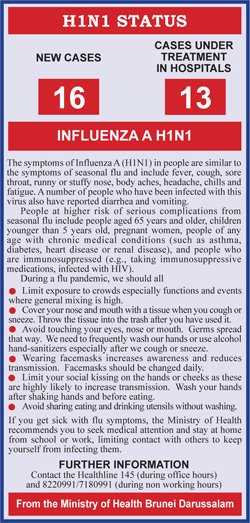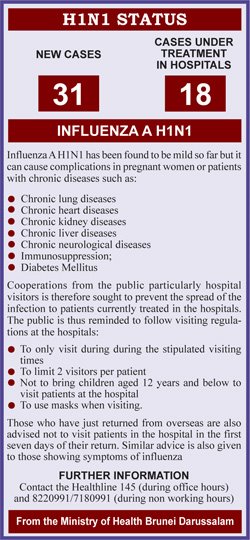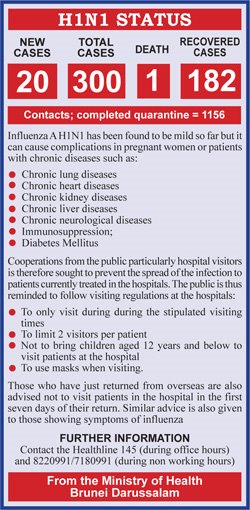Borneo Bulletin, 22 July 2009
By Azlan Othman
If you have the flu bug, the chances of it being the H1N1 virus is now higher than it was a few weeks ago, according to Singapore's Health Ministry.
As of Monday, the ministry recorded 64 cases of H1N1 flu, with five patients in intensive care, the Straits Times reported Tuesday.
Brunei recorded some good news on Monday when the sultanate did not report any new cases - the first time since the nation was hit by the flu exactly a month ago. Meanwhile, those undergoing treatment stood at 28 cases on July 20.
While Brunei health officials expect to get back to Bulletin on the matter, the latest Singapore Health Ministry data shows that 53 per cent of patients with flu-like symptoms - cough, fever or a runny nose - have been infected with H1N1. This shows an increase from a month ago, when only 13 per cent tested positive for the new virus.
This number will continue to grow as the H1N1 strain replaces other influenza strains and becomes the dominant one this season, Singapore's Health Minister Khaw Boon Wan said in parliament on Monday.
American city health officials had earlier said the number of people with flu-like symptoms at hospital emergency rooms had declined rapidly since reaching a peak on May 25, while those hospitalised for H1N1 hit a peak on May 27 there.
The phenomenon is taking place as the community acquires "herd immunity," which refers to a slowdown in the rate of increase as more people become exposed to the virus.
The overall risk of death is similar to the normal seasonal flu, but risk groups differ, said the minister. For the normal flu, those older than 65 and younger than two years are at highest risk. But for H1N1, young adults who have medical problems, low immunity, are extremely obese or are pregnant are at higher risk. Focussing on these, full recovery will be one of three priorities, he added.
Wednesday, July 22, 2009
Subscribe to:
Post Comments (Atom)



No comments:
Post a Comment